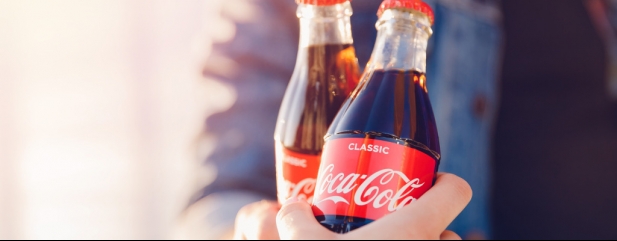Archived article
Please note that tax, investment, pension and ISA rules can change and the information and any views contained in this article may now be inaccurate.
Coca-Cola shares are trading at a rare bargain level

Shares in beverages behemoth The Coca-Cola Company (KO:NYSE) plunged with the wider market in March. Yet despite recovering from their 52-week low of $36.27, they remain some 20% off their $60 one-year high, having failed to join in with the rally led by the US technology giants and other stay-at-home beneficiaries.

Shares believes this is an attractive entry point for a patient long-term investor, as this consumer defensive colossus has proven pedigree in surviving challenging periods and emerging stronger.
Coca-Cola trades on a cyclically adjusted price-to-earnings (PE) multiple of 22 for 2021, falling to 20.8 for 2022, according to M23 Research.
This is bargain territory for the stock. Looking back over the last 25 years, Coca-Cola has traded on a cyclically adjusted PE of 29.1. Mean reversion suggests that asset prices will eventually revert to the long-run average and Coca-Cola has done this on many occasions in the past. It gives us confidence that over the next few years we could see the shares trading back towards 29 times earnings.
If earnings remain static for the near-term, mean reversion implies a share price towards $60. However, analysts expect a decent recovery in earnings during 2021.
Consensus forecasts have pre-tax profit dipping to $9.72 billion in 2020 (last year: $11.31 billion). Next year they are expected to jump to $11.04 billion and hit $12.18 billion in 2022. This year’s earnings decline is already priced in by the market and investors are now more focused on what corporates will be doing in 2021 and beyond.

COKE’S UNBREACHABLE MOAT
Listed in New York, The Coca-Cola Company is the business behind Coca-Cola or ‘Coke’, the world’s most recognised soft drink. The $208 billion cap manufactures and sells concentrates and syrups to its 300 bottling partners. It still owns the brands and controls brand marketing initiatives.
The bull case is so much more than its eponymous brand, because Coca-Cola is a total beverage behemoth offering over 500 brands in more than 200 countries and territories. It is also a premium juice, organic tea and coconut water concern.
Its brands include four of the world’s top five non-alcoholic sparkling drinks, namely Coca-Cola, Diet Coke, Sprite and Fanta and lesser-known names such as Dasani, Powerade and Minute Maid. The Coca-Cola Company also owns two UK household names: coffee brand Costa and mixers brand Schweppes.
Long-term, Coca-Cola has been a market-beating investment with dividends forming an important part of the total returns for investors, although we acknowledge the business is challenged in the short-term.
DEMAND BEGINS TO IMPROVE
Coca-Cola’s sales fell 28% to $7.2 billion and earnings per share declined 32% to $0.41 in a coronavirus-impacted second quarter to 26 June.
These declines were mainly driven by pressure in ‘away-from-home’ channels, which speak for around half of Coca-Cola’s sales. Chief executive James Quincey believes the second quarter will prove to have been the most challenging of the year, suggesting the worst is now over.
Encouragingly, since Coca-Cola’s previous update three months ago, global unit case volume trends, a key demand indicator, have improved sequentially from a decline of roughly 25% in April to a decline of about 10% in June as lockdowns eased and with July also exhibiting signs of improvement.
Coca-Cola said it was seeing improving trends in away-from-home channels, namely restaurants, cinemas and entertainment venues, along with sustained, elevated sales in at-home channels.
Assuring the market that the balance sheet remains robust, and the company is confident in its liquidity position as it continues to navigate through the crisis, Coca-Cola is in a strong position to profit as the world reopens and thirsty populations emerge from lockdown
around across the globe.
RISKS TO WEIGH
Admittedly, Coca-Cola competes in a mature industry and fizzy drink consumption is reducing in developed markets due to the increase in health-conscious consumers and government-imposed taxes on sugar-laden products.
Covid-19 has also disproportionately impacted people who are overweight and government initiatives, such as Boris Johnson’s new anti-obesity strategy, could present a headwind.

Nevertheless, it is worth remembering Coca-Cola’s brand resonance in the non-alcoholic beverage category has been going strong for over 130 years and low and no-sugar products, notably Coca-Cola Zero, have proved successful.
As part of a balanced diet, a can of Coke represents an affordable treat, as does the equity of The Coca-Cola Company.
Important information:
These articles are provided by Shares magazine which is published by AJ Bell Media, a part of AJ Bell. Shares is not written by AJ Bell.
Shares is provided for your general information and use and is not a personal recommendation to invest. It is not intended to be relied upon by you in making or not making any investment decisions. The investments referred to in these articles will not be suitable for all investors. If in doubt please seek appropriate independent financial advice.
Investors acting on the information in these articles do so at their own risk and AJ Bell Media and its staff do not accept liability for losses suffered by investors as a result of their investment decisions.
Issue contents
Editor's View
Feature
First-time Investor
Great Ideas
- Kainos up 50% since we said to buy, helped by knock-out trading update
- Our ‘buy’ call on resilient Texas Instruments gets off to solid start
- Coca-Cola shares are trading at a rare bargain level
- Recent share price dip is nothing to worry about with Tristel
- Keep buying AG Barr as latest update is very encouraging
- Knights set to lure top lawyers and their clients from rival law firms

 magazine
magazine








